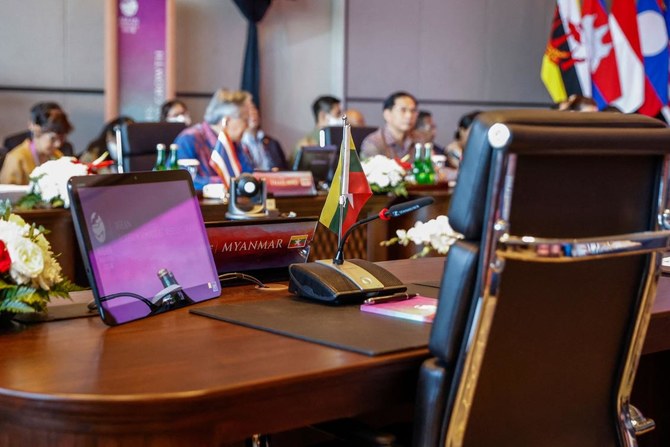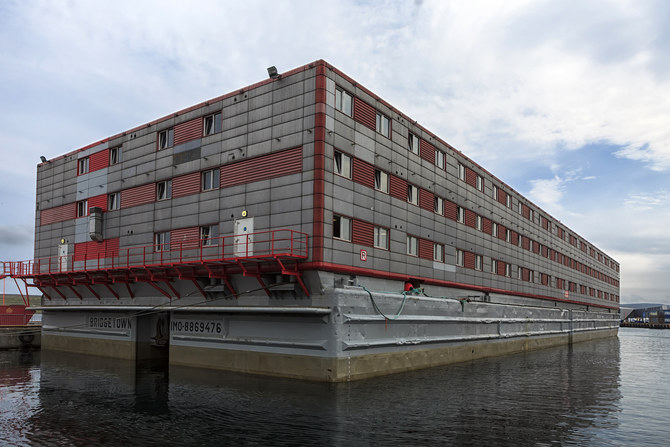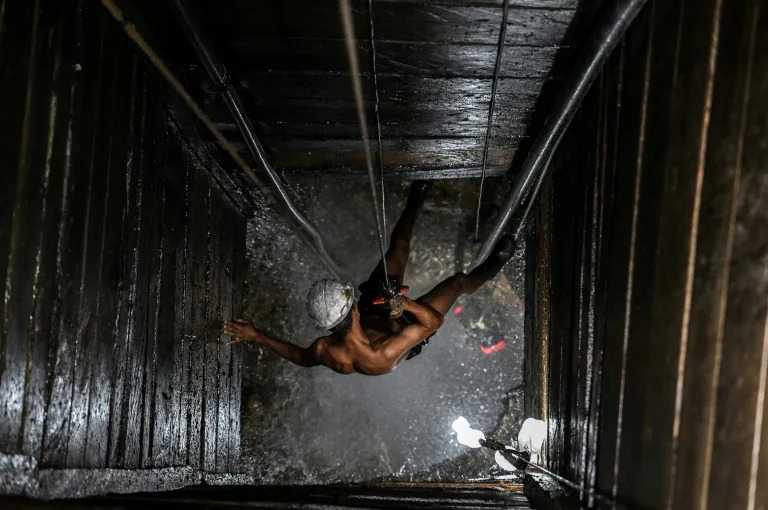ASEAN at a ‘crossroad’ as Myanmar violence escalates

ASEAN’s diplomatic attempts to resolve the crisis have been fruitless as the junta ignores international criticism and refuses to engage with its opponents. Above, a vacant chair for the Myanmar delegation during the ASEAN Foreign Ministers’ meeting in Labuan Bajo, Indonesia on May 9, 2023. (AFP)
Updated 09 May 2023
AFP
Myanmar has been ravaged by deadly violence since a military coup deposed Aung San Suu Kyi’s government more than two years ago
LABUAN BAJO, Indonesia: Southeast Asian nations are at a “crossroad,” a senior Indonesian minister warned Tuesday, as escalating violence in junta-controlled Myanmar loomed over a regional summit.
Myanmar has been ravaged by deadly violence since a military coup deposed Aung San Suu Kyi’s government more than two years ago and unleashed a bloody crackdown on dissent.
The Association of Southeast Asian Nations (ASEAN) — long-decried by critics as a toothless talking shop — has led diplomatic attempts to resolve the crisis.
But those efforts have been fruitless, as the junta ignores international criticism and refuses to engage with its opponents, which include ousted lawmakers, anti-coup “People’s Defense Forces” and armed ethnic minority groups.
An air strike on a village in a rebel stronghold last month that reportedly killed about 170 people sparked global condemnation and worsened the junta’s isolation.
It also fueled calls for ASEAN to take tougher action to end the violence or risk being sidelined.
“ASEAN is at a crossroad,” Mahfud MD, Indonesia’s coordinating minister for politics, legal and security, warned Tuesday on the first day of the summit.
“Crisis after crisis is testing our strength as a community. And failure to address them would risk jeopardizing our relevance,” he said according to a copy of his remarks, listing Myanmar among the emergencies facing the bloc.
Human Rights Watch said Tuesday that last month’s air strike in the central Sagaing region was a “likely war crime,” and urged ASEAN to “signal its support for stronger measures to cut off the military’s cash flow and press the junta for reform.”
Pressure on the regional bloc increased Sunday after a convoy of vehicles carrying diplomats and officials coordinating ASEAN humanitarian relief in Myanmar came under fire.
Few details have been released about the shooting in eastern Myanmar’s Shan State, but a foreign diplomat in Yangon said diplomats from the embassies of Indonesia and Singapore were in the group.
Singapore confirmed two staff members from its embassy in Yangon were in the convoy but unharmed.
“Singapore condemns this attack,” its foreign ministry said late Monday.
Indonesia, the ASEAN chair this year, has not yet said if its diplomats were in the vehicles.
The shooting happened days before the May 9-11 ASEAN summit on the Indonesian island of Flores, where foreign ministers and national leaders will continue efforts to kick-start a five-point plan agreed upon with Myanmar two years ago after mediation attempts to end the violence failed.
The foreign ministers held talks Tuesday while their countries’ leaders were scheduled to meet Wednesday and Thursday.
Ahead of the arrival of officials in Labuan Bajo, the army deployed more than 9,000 personnel and warships to the small fishing town that serves as the entrance to Komodo National Park, where tourists can see the world’s largest lizards.
In her opening remarks Tuesday, Indonesian Foreign Minister Retno Marsudi said the ministers had already discussed “the implementation” of the peace plan, but she did not elaborate.
A Southeast Asian diplomat said that Sunday’s shooting “raises the urgency of Myanmar as a key discussion point at this summit.”
The US State Department said it was “deeply concerned” about the shooting and urged the junta to “meaningfully implement the Five-Point Consensus.”
Myanmar remains an ASEAN member but has been barred from top-level summits due to the junta’s failure to implement the peace plan.
Marsudi said Friday that her country was using “quiet diplomacy” to speak with all sides of the Myanmar conflict and spur renewed peace efforts.
ASEAN has long been criticized for its inaction, but its initiatives are limited by its charter principles of consensus and non-interference.
US-based analyst Zachary Abuza said the group was unlikely to offer more than “another milquetoast statement of condemnation” despite Sunday’s attack.
“Had a diplomat been killed, there would have been more pressure on the organization to do something, but frankly they’ve been so feckless in the past two years that it’s hard to see them actually acting in a meaningful way,” Abuza said.









